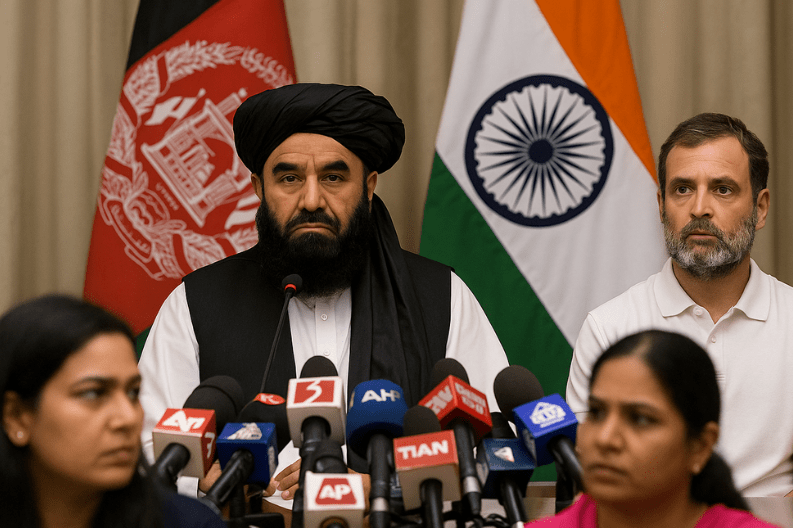The world continues to question the Taliban approach to women as their policies keep women away from public life. Since taking control of Afghanistan in August 2021, the Taliban has almost erased women from education, employment, and political spaces. This situation has created global criticism, including in India, where a recent incident highlighted their anti-women stance once again.
During his recent visit to India, Amir Khan Muttaqi, Afghanistan’s foreign minister, held a press conference in New Delhi. However, women journalists were denied entry, sparking outrage across the media and civil society. The Ministry of External Affairs (MEA) responded quickly, explaining that it had no control over the invite list. Officials clarified that foreign embassies function independently and are not bound by Indian government rules. Despite this, the event raised serious concerns about gender equality and press freedom.
Many Indian leaders and citizens reacted strongly. Rahul Gandhi criticized the government, accusing Prime Minister Narendra Modi of failing to defend women’s rights. He argued that by allowing this exclusion, the government sends a message that it is too weak to support women’s participation in public spaces. Gandhi emphasized that every woman in India deserves equal access and representation.
India’s relationship with the Taliban has changed significantly. For many years, New Delhi refused direct contact with the group. But recent geopolitical shifts, including the Taliban’s strained ties with Pakistan, have altered India’s approach. Muttaqi’s visit was especially significant because he remains under UN Security Council sanctions. India sought special permission from the UN Sanctions Committee to host him — a clear sign of evolving diplomatic priorities.
During the visit, External Affairs Minister S. Jaishankar announced that India would upgrade its technical mission in Kabul to a full-fledged embassy. This decision indicates that New Delhi is preparing to deepen engagement with the Taliban. However, this development has raised concerns among women’s rights activists. They argue that without reforms in Taliban ideology, closer ties could send the wrong message.
Prominent activists voiced strong opposition. Shabnam Hashmi said expecting the Taliban to change its anti-women policies is unrealistic. She criticized India for allowing such ideologies on its soil, calling it a betrayal of democratic values. Similarly, Zakia Soman warned that tolerating Taliban-style discrimination contradicts India’s constitutional principles of gender equality and justice.
The exclusion of women journalists also revealed the Taliban’s mindset. They were barred simply because their names were not on an invitation list. Kirti Singh from the All India Democratic Women’s Association described this as a deliberate attempt to silence women. She added that allowing such behavior in India was deeply shameful and could normalize gender-based exclusion.
This incident has broader implications for both Afghanistan and India. The Taliban’s consistent suppression of women continues to shape how they are treated globally. In India, it raises difficult questions about whether diplomatic engagement should come at the cost of core values like gender equality. Critics fear that allowing such actions could influence how other groups view women’s roles in public life.
Indian women have long fought for equal rights, representation, and recognition. They have made significant contributions in politics, media, business, and education. Excluding them from important public events not only disrespects their achievements but also undermines India’s commitment to gender justice.
In conclusion, the Taliban approach to women stands in direct conflict with India’s democratic principles. Activists and citizens continue to call for strong action and accountability. They insist that India must uphold its values, both at home and abroad, and refuse to compromise on women’s rights. As global attention remains focused on this issue, the future of women’s participation in both Afghanistan and India will depend on how governments respond to such challenges.



